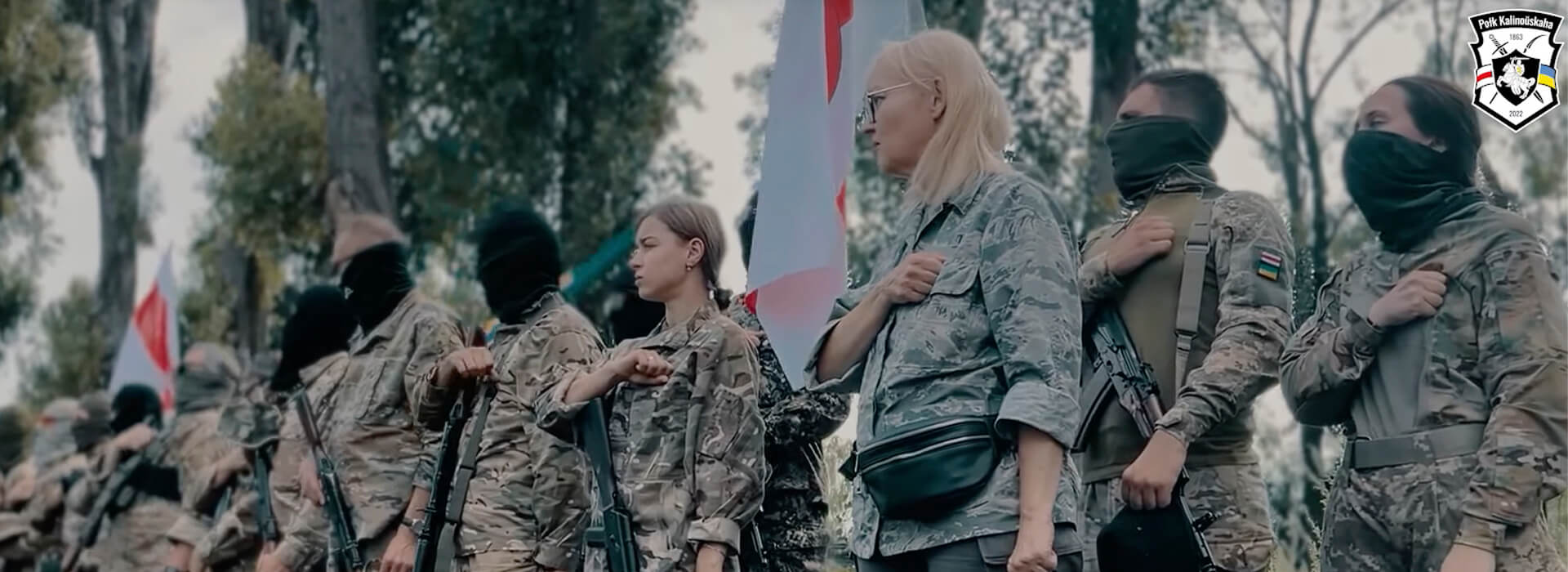- GROWING NUMBER OF BELARUSIAN VOLUNTEERS IN UKRAINE'S ARMY
- REPRESSIONS AND MEDIA
- ECONOMIC UPDATE
- STILL NO CLARITY WITH INTERNATIONAL STATUS OF BELARUS
GROWING NUMBER OF BELARUSIAN VOLUNTEERS IN UKRAINE'S ARMY
Belarusian military units in Ukraine’s army continue their expansion. On August 7, a new group of Kalinouski Regiment volunteers fighting in Ukraine’s foreign legion took a solemn oath of allegiance to Belarus. At least three women joined the regiment recently – they took an oath along with male members of this military group. As of August 2022, Kalinouski Regiment is the largest Belarusian military formation in Ukraine, and it consists of three battalions with an undisclosed number of recruits. Two battalions, Volat and Terror, were formed in spring-summer 2022, and the third battalion, Litvin, is currently being recruited from both inside Belarus and Belarusian diaspora (predominantly, in the EU).
Overall, the number of Belarusian citizens fighting own Ukraine’s side is estimated as nearly 1500 troops – with up to 20 soldiers killed or missed in action in the last six months. At least 100 Belarusian volunteers were trained in Poland and Czech Republic as a part of separate Pahonia Regiment that is believed to be prepared for niche special operations. All Belarusian volunteer groups in Ukraine repeatedly stated that they aim to play key role in ousting Aliaksandr Lukashenka and his regime in Belarus after the end of Russia’s aggression against Ukraine.
REPRESSIONS AND MEDIA
Belarus remains one of «the most dangerous places for journalists» internationally: and often it is treated even more dangerous that war-torn countries like Iraq since there are no permanent rules applied by Lukashenka regime to media professionals. The imprisonment of even former and long inactive independent media workers remains a daily routine even two years after 2020 elections.
Journalists, bloggers and media workers remain a professional target group that suffered the hardest in post-2020 crackdown with all independent media pushed out of Belarus. Media workers in Belarus are treated in a way similar to high-rank terrorists and face long prison terms. Last week, Iryna Slaunikava (52), a journalist with the Poland-based TV channel Belsat, was convicted of «forming an extremist organization» and was sentenced to five years in prison. A total of 30 journalists are currently behind bars, either awaiting trials or serving lengthy sentences. The distribution of information remains a crucial element of resistance.
ECONOMIC UPDATE
In response to growing post-February-24 exodus of civilians from Belarus (especially young middle class, high tech professional and entrepreneurs), Minsk regime has announced its plans to simplify citizenship process for citizens of Lithuania, Latvia and Poland. The move is not just a part of propaganda to promote «Belarusian economic model». Belarusian economy is approaching some more difficult times after Moody’s, S&P and Fitch cut Belarus to default due to inability of Lukashenka regime to make its bond payment in dollars due to sanctions. However, default on bonds mainly means that Minsk will not be able to get loans from foreign partners who would’ve not provided loans anyways.
Nevertheless, lack of qualified personnel is not the only problem approaching Lukashenka and his people: sanctions severe access of Belarus to Western technologies. Although sanctions proved effective in some cases (such as supply of modern planes from the United States), certain countries (like Britain) showed growing trade with Belarus in 2021-2022: despite sanctions and the largest campaign of state-run political terror in 50 years of Europe’s history.
STILL NO CLARITY WITH INTERNATIONAL STATUS OF BELARUS
Although regional experts and officials from Estonia and the UK acknowledge that Lukashenka has no control or «final say» in matters concerning the presence and activity of Russia’s military in the territory and airspace of Belarus, there is no visible progress in matters concerning the recognition of Belarus as an occupied territory or acknowledgement of Lukashenka and his regime as accomplices in Russia’s war against Ukraine. The U.S. policy on that matter, likely, remains delayed because the position of special envoy for Belarus remains vacant for almost two months now (despite key role of Lukashenka regime in Russia’s war against Ukraine). Last week, the U.S. Senators called on Biden administration to fill the vacant role as soon as possible (for full letter, click here).
Ukraine, however, remains reluctant and vague on its long-term policy towards Belarus even half a year after the full-scale invasion began. Despite direct participation of Lukashenka regime in the act of aggression against Ukraine since February 24, 2022 and ongoing missile attacks on Ukraine’s civilian targets from Belarusian airspace, Ukraine continues to maintain diplomatic relations with Belarus. Instead of building a network of supporters inside Belarus or strengthening pro-Ukrainian views among Belarusian audiences through influencers and trusted independent media, Ukrainian elites refrain from proactive steps such as building alliances with underground groups in and outside of Belarus.
According to the General Staff of the Armed Forces of Ukraine, last week Russia has been «deploying additional armed forces and air defense equipment in the territory of the Republic of Belarus, on the Volyn and Polissia fronts.» This statement was reported by a wide range of foreign media, but neither iSANS sources in Belarus, nor Belarusian Hajun Project found any confirmation of such deployments.
Despite supportive rhetorics internationally, only two governments (Lithuania and Ukraine) so far agreed to host representation offices of Sviatlana Tsikhanouskaya in their countries. However, even they continue formal diplomatic relations with Lukashenka regime and its illegal and illegitimate «former representatives» in Belarusian diplomatic and consular offices. The West should avoid failing again in its foreign policy targeting Belarus (just like it largely did since 1990s), and must act decisively rather than remain largely an observant. The West must change its policy targeting Belarus from vague and symbolic half-steps to decisive and strong actions – just like it does in Ukraine’s case.
Best regards,
iSANS team










